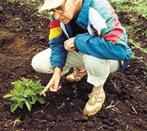 Ian Robertson, agricultural scientist, examines virus-free sweet potato crop, Zimbabwe
Ian Robertson, agricultural scientist, examines virus-free sweet potato crop, Zimbabwe
Zimbabwean small scale farmers are benefiting from 'born again' sweet potato plants, developed by Zimbabwean scientists, that have had a damaging virus removed.
As President Robert Mugabe of Zimbabwe celebrated his 82nd birthday in February 2006, his home affairs minister, Kembo Mohadi, official admitted that the country faced a serious food shortage. 'There is no grain whatsoever. Our people are actually starving,' he said on national radio*1.
Zimbabwe , once the breadbasket of southern Africa , has seen such a collapse in its agricultural base that over five million people needed charity to prevent starvation by the end of 2005, according to the UN's World Food Programme. President Mugabe's land reforms have seen a dramatic drop in commercial maize production, leaving nearly 40 per cent of the population undernourished.
Poor harvests in 2002 and 2003 left millions of people needing food assistance. In 2004, Zimbabwe's farmers planted only about a third of their usual fields and the World Food Programme designated Zimbabwe as a 'hunger emergency zone'.
Yet small scale farmers are not without hope. They are benefiting from 'born again' sweet potato plants, developed by a team of Zimbabwean scientists. The six agricultural graduates are employees of Agri-Biotech, founded by Edinburgh scientist Dr Ian Robertson, the company's chief executive, who teaches agriculture at the University of Zimbabwe in Harare .
The plants make it possible for a 30-metre square plot to feed a family of seven all year. Farmers sell on runners to their neighbours and, during 2003 and 2004, over 30,000 people benefited. That was just the beginning. 'Since then we have delivered direct to another 3,000 beneficiaries in two districts, as well as to a large number of beneficiaries on an emergency basis,' says Robertson. 'The multiplyer effect of them selling on to neighbours is uncalculable. In 2005 we delivered to 3,000 farmers on behalf of Care International as well as to 2,000 farmers for Save the Children Fund.' Several other non-governmental organisations funded Agri-Biotech's support for some 30 orphanages, which in turn have sold on to some 600 supporting parishioners. So far Agri-Biotech has covered eight of Zimbabwe's 56 districts, chosen by the Zimbabwe Farmers Union.
The Agri-Biotech team call the plants 'born again' because they have found a way of removing the virus that plagues sweet potato crops. In a GM-free tissue culture process, they employ cutting edge science literally. They dissect out the 0.25mm tip of the bud, which is free from viruses and other micro-organisms, and throw the rest away. The lab team then grow the bud tip in a test tube for nine months into a virus-free plant, and keep on sub-culturing it to increase numbers.
From there they transplant the plants into plastic greenhouse tunnels and take cuttings from them. These are bought by donors, such as the Swedish Centre for Co-operation, at US$0.05 each. The Swedish aid agency has funded Agri-Biotech to supply 3,000 starter plants to 240 nursery farmers. 'We need good lab work plus good greenhouse work to deliver to good farmers,' comments Robertson, whose Edinburgh PhD is in plant tissue culture.
Unfortunately, the virus cleansing is not permanent. 'Like some Christians they can backslide,' says Robertson, who adds that all his team are Christians. 'The clean plants will inevitably pick up new viruses and degenerate. Farmers come back to us for new clean material every few years.'
The starter plants grow in August, and are irrigated during the following months of sunshine. Many resettlement farmers have access to a well, stream or irrigation system. Each of the 240 farmers can then sell the runners to over 100 neighbours in time to plant for full growth during the rainy season, which arrives in December.
Meanwhile the greenhouse nurserymen lift the virus-free sweet potato tubers and sell them early when prices are good, at a time when neighbours are growing for 'stomach-fill' for their families. Nothing is wasted. Tubers that are too small or two big to sell at the market, or are damaged by insect pests, are fed to cattle, which love them.
Boy Ncube was one of 20 nurserymen who were trained, over three days, in nursery management and field production by Agri-Biotech's Liaison Officer Reuben Tayengwa. Agri-Biotech then supplied Ncube with 3,000 rooted cuttings of 'Brondal' sweet potato as well as 200 stakes of ' Zambezi ' cassava. With the help of a small amount of organic fertiliser, Ncube grew vines to sell. Over two years, his 30 metre square plot expanded to three hectares. He has turned his initial delivery of US$150 into sales of $16,000. This has allowed him to buy a milk cow. He is building a bricks and mortar house for himself and his wife, and will buy a bakkie (pick-up truck) to carry his tubers to market. His best field has yielded 50 tons per hectare, compared with the national average of six tons.
Nicholas Chimbwedza started farming 2.5 hectares of Brondal two years ago, after failing to get a job in town. Selling vines, fertilized with cattle manure, earned him US$150. He has recently started harvesting tubers from just 0.16 hectares and has earned $1,000. This has enabled him to buy a new pump for his field. He expects ultimately to earn over US$15,000. Dickson Gumede has 0.32 hectares and expects a harvest of eight tons on a yield per hectare of 25 tons. From sales he has earned several thousand dollars in the last two years.
Agri-Biotech's donor, the Swedish Centre for Co-operation, has estimated that, for every kroner they invest in the projects, each of Agri-Biotech's farmers have earned four kroner. 'And they have fed their own families with quality food, high protein, decent amino acids and plenty of carbohydrates. The beneficiaries are very happy,' Robertson says.
In the food emergency, the Swedish Centre contracted Agri-Biotech to deliver 1,000 plants each to another 1,000 'beneficiaries': disadvantaged orphans, old people who have lost their 'middle generation' to HIV/AIDS, and single parents. 'We delivered in September 2005 and the growth is good, 'says Robertson.
In the two years 2003 and 2004, thanks to Agri-Biotech's research and donor funding of some US$300,000, the farmers cashed in $1,200,000, Robertson says. The company itself made only $50,000 but it employed, at that time, eight graduates.
The UK's Department for International Development is 'very impressed with the excellent work and dedication of Ian Robertson and his team,' says Tom Barrett in DFID's Zimbabwe office. 'We are developing a programme in collaboration with several NGOs working in Zimbabwe and Agri-Biotech that will disseminate the improved sweet potato planting material to as many as 15,000 of the poorest households in Harare and Bulawayo. If successful, and it is possible to scale up, then we hope to support a larger programme that will reach even larger numbers in other urban and rural areas next year. This is a unique opportunity to help people feed themselves without requiring unaffordable external inputs.'
The opportunities are great and Robertson emphasises the huge potential in cassava crops. 'Two hundred million Africans use cassava as a staple diet every day,' he says. 'We can produce 40 to 70 tons per hectare, with a potential of 100 tons.' It is also a primary source of starch needed in the manufacture of a range of products, from baked beans to adhesive tape. Building a starch factory would offer "a huge import substitution", and would cost only US$50,000, Robertson estimates.
He and his wife, Valerie, who teaches microbiology at the University of Zimbabwe , are dedicated to Africa. As research scientists they could be earning 10 times their salaries at an American university. Instead their faith called them to serve in Africa , after Robertson was invited to take part in a multiracial conference, organised by Moral Re-Armament, held at the University in 1975. He and his wife returned in 1977 and have lived there ever since. Robertson now speaks of 'the daily habit of wishing to take part in God's plan for humanity', through early morning times of silent reflection.
He emphasises Agri-Biotech's strict ethical policy of integrity, transparency and sincerity. Integrity, says Robertson, means 'no cheating on expenses, no ghost journeys paid by the sponsors, no lies to farmers'. Transparency means: 'sharing our ideas with farmers; listening to their problems, history and experience; never bluffing if we do not know; avoiding political judgements; telling the truth about our own vulnerability'. And sincerity means that the company delivers the plants when promised; shares ideas on hopes for the future; lets the farmers know what the company is earning; and 'above all gets the job done whatever excuses are available'.
To find out more, email: agbio@mweb.co.zw
Updated from articles first published in For A Change magazine, December 2004-January 2005; African Business magazine, December 2004; Guardian Weekly, 18-24 February 2005.
*1. Reported by Jan Raath, The Times, London , 21 February 2006.


